Fatma Khaled reports on Cairo Gaza, an activist group that is pressuring the el-Sisi government to keep the Rafah crossing open to let aid into Gaza without Israel’s permission.
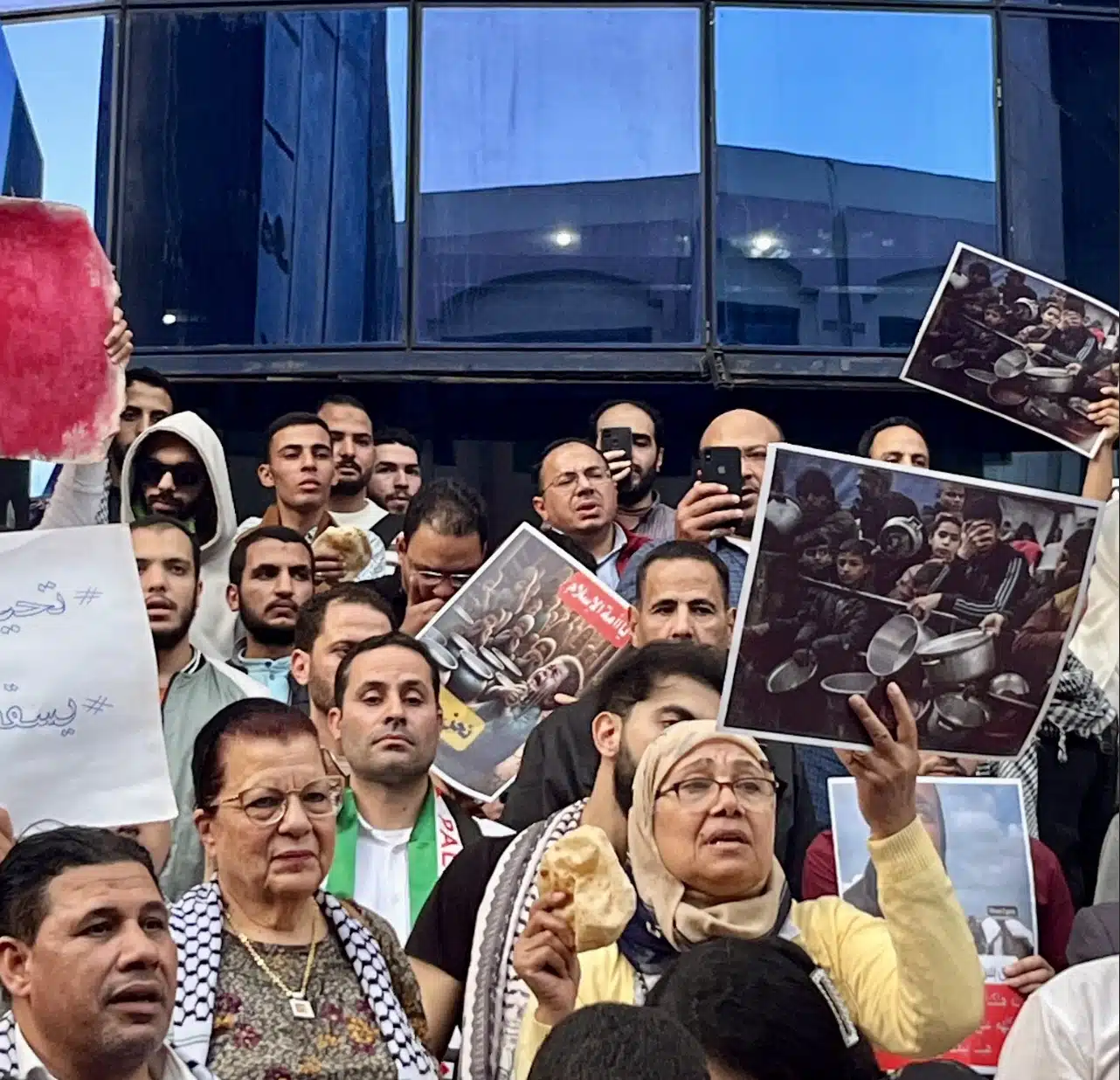
Protests in Cairo in solidarity with Gaza defy a national ban on demonstrations. (Fatma Khaled/ PassBlue)
By Fatma Khaled
in Cairo
PassBlue
Hundreds of Egyptians are pressuring their government to let them form an international civilian convoy to escort lifesaving humanitarian aid into Gaza after six months of deprivation has pushed many to the brink of starvation if not famine.
In a related rare challenge to the Egyptian government — after a protest in solidarity with Gaza on April 3 by dozens of activists the regime responded in typical fashion: at least 10 protesters were arrested at their homes that night and the next morning after participating in the demonstration. They were soon released.
In Gaza, the search for food grows more chaotic as humanitarian aid convoys remain stuck outside the enclave, airdrops of food reach just a fragment of people and the United States-led project to build a floating pier by the end of April, off the coast, is in deep negotiations among the U.S., United Nations (including the World Food Program and the Office for the Coordination of Humanitarian Affairs), Israel Defense Forces and other political and humanitarian parties.
Outstanding questions include where the pier will be located and how it will be secured. The U.N. wants the pier to be situated near northern Gaza, where people are most desperate.
Raed Alhelou, a Gazan who evacuated to Egypt recently, said that that aid entering the enclave is never enough and that the 2.1 million Palestinians living across the strip struggle to find food amid bombardments and attacks by the Israel Defense Forces, or IDF.
Alhelou, who worked as a financial manager before the war, told PassBlue over the phone that he and his family ate only a few cucumbers and tomatoes daily when they were still in Gaza, if they could find them. Meat was not available, except when aid trucks delivered it, but it was difficult to buy it. Alhelou said he saw a whole chicken selling for 100 shekels ($27).
The group of activists trying to organize a civilian aid convoy consists of doctors, lawyers and members of the Bread and Freedom socialist political party. They sent a letter to the Egyptian Foreign Ministry with more than 13,000 signatures from across the Arab region, urging the delivery of the tons of aid piled up at Egypt’s Rafah crossing into the Gaza strip, sent there to avoid the lengthy inspections imposed by Israel. The activists want the convoy to have civilians from around the world participating.
Their petition is part of a campaign led by a group called Cairo Gaza, formerly known as Global Conscience Convoy, which has been pressuring Egypt to keep the Rafah crossing open to let aid into Gaza without Israel’s permission. So far, Egyptian authorities have not engaged with the campaign.
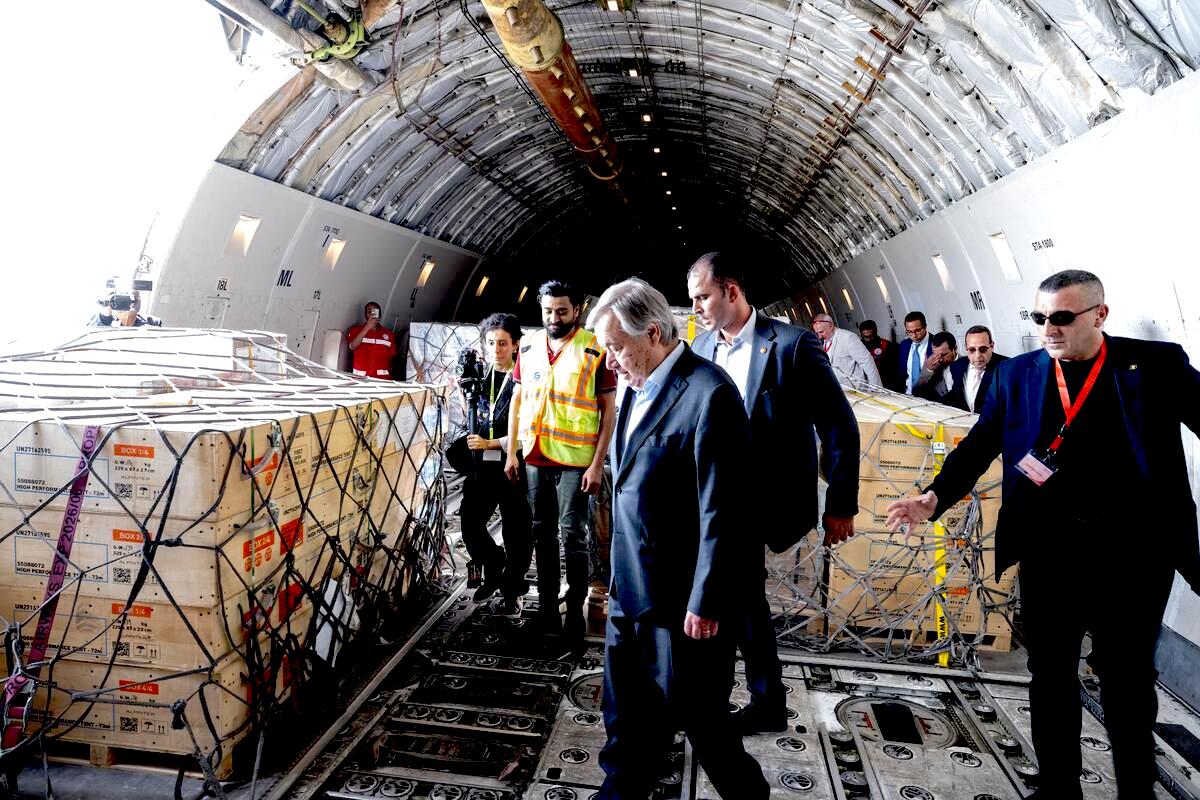
U.N. Secretary-General António Guterres (centre) walks by supplies at the Al-Arish Airport in Egypt, on his way to the Rafah border crossing between Gaza and Egypt on Oct. 20, 2023. (UN Photo/Eskinder Debebe)
Officially, Egypt controls its side of the Rafah crossing while Palestinian authorities control the Gazan side. However, Israel has been indirectly controlling the Gazan side in the war by rejecting the entry of certain humanitarian aid goods — such as maternity kits — and by making the crossing minimally operational and unsafe for convoys to enter.
“Egypt’s role here is weak, given that it is a bordering country and not pressuring Israel to let more aid in,” Mahinour el-Massry, a prominent Egyptian human rights lawyer, told PassBlue.
When asked about the petition to create a civilian convoy, Ahmed Abu Zeid, the spokesperson for Egypt’s Ministry of Foreign Affairs, told PassBlue that per standard procedure, it takes time for the ministry to review initiatives before approving plans. No other details were provided.
Aid delivery into Gaza can be deadly. On April 1, the IDF struck three vehicles belonging to the World Central Kitchen, a prominent international humanitarian charity, killing seven of its workers. Israeli Prime Minister Benjamin Netanyahu said the fatal attacks were “unintentional” and “happens in war.”
The United States-based charity is demanding an independent investigation into the murders, after Israel concluded its own inquiry on April 5, saying the “incident should not have occurred.” At least 196 humanitarians, including UN workers, have been killed since Oct. 7 in Gaza.
As a result of the World Central Kitchen deaths and an angry phone call from President Joe Biden, Netanyahu agreed to open the Israeli side of the Erez crossing in north Gaza and allow aid shipments to go through the Israeli port of Ashdod, also in the north, as well as take other remedial steps.
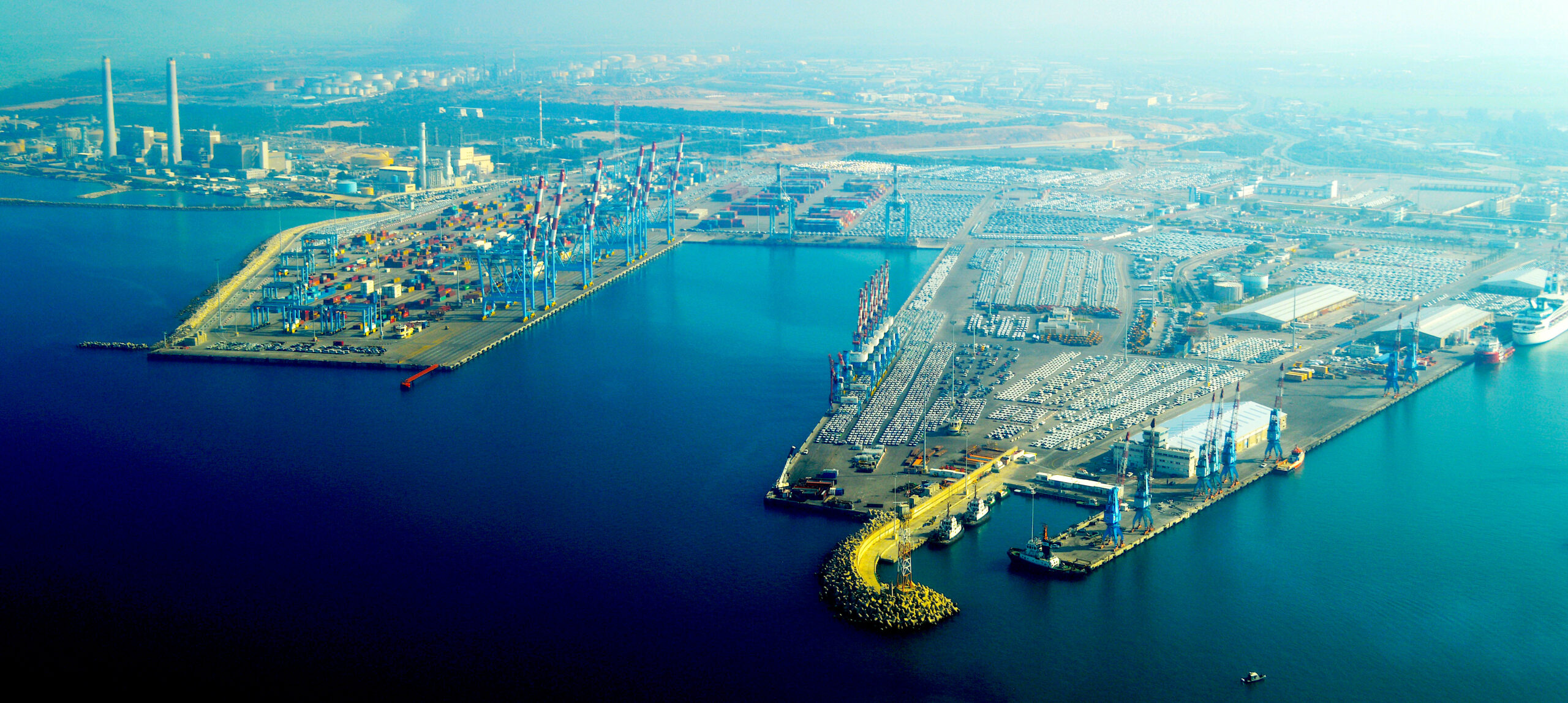
Aerial view of Ashdod Port. (Amos Meron, Wikimedia Commons, CC BY-SA 3.0)
António Guterres, the U.N. secretary-general, said on April 5: “I sincerely hope that these announced intentions are effectively and quickly materialized because the situation in Gaza is absolutely desperate.”
So far, there is no action on the proposal from Israel, a U.N. official told PassBlue.
Compassion for Gazans
The Cairo Gaza advocates are calling out the failures to meet basic needs in Gaza.
Their petition reads:
“The international community has failed to end the relentless bombardment of civilian shelters, hospitals, mosques, and churches. It is even failing to call for a ceasefire. Could we, from Egypt, at the very least, deliver humanitarian aid? Egypt is the only state that shares a land border with Gaza. The Rafah Crossing is the Strip’s only artery, which is not controlled by the Occupation. Nor should it be.”
El-Massry, the human rights lawyer, said that a convoy made up of public figures and parliamentarians worldwide could help get more assistance into Gaza.
“Earlier on in the war, there were requests to establish an international human convoy, but they didn’t receive much attention,” el-Massry said. “Even though it would have helped with exerting international pressure on governments to address the humanitarian aid crisis.”
Civilians escorting aid trucks into Gaza would face huge risks because, among other problems, Israel is bombing areas near the border, in Rafah City, most recently ignoring a U.N. Security Council resolution demanding a ceasefire during Ramadan, which ends on April 9.
The specifics of how a civilian convoy would go to Rafah are unclear, but activists are hoping the U.N. would help ensure that relevant international laws on humanitarian aid delivery would be followed. Yet Israel is not abiding by such laws in making aid available into Gaza, as the International Court of Justice has determined.
Moreover, the U.N. would be likely to defer any role in a civilian convoy to the Egyptian Red Crescent, a U.N. official told PassBlue.
A total of 251 aid trucks entered Gaza from the Rafah crossing and the Kerem Shalom crossing, along the Israeli border, on March 31, according to the official Telegram channel for Egypt’s Rafah crossing.
The amount is half of what entered Gaza daily before the Israel-Hamas war broke out on Oct. 7. The U.N. says that Gaza needs at least 500 to 600 trucks daily, carrying essential goods and commercial items to help victims in the war. International air drops have been heavily criticized by humanitarian groups as being grossly inefficient and dangerously haphazard.
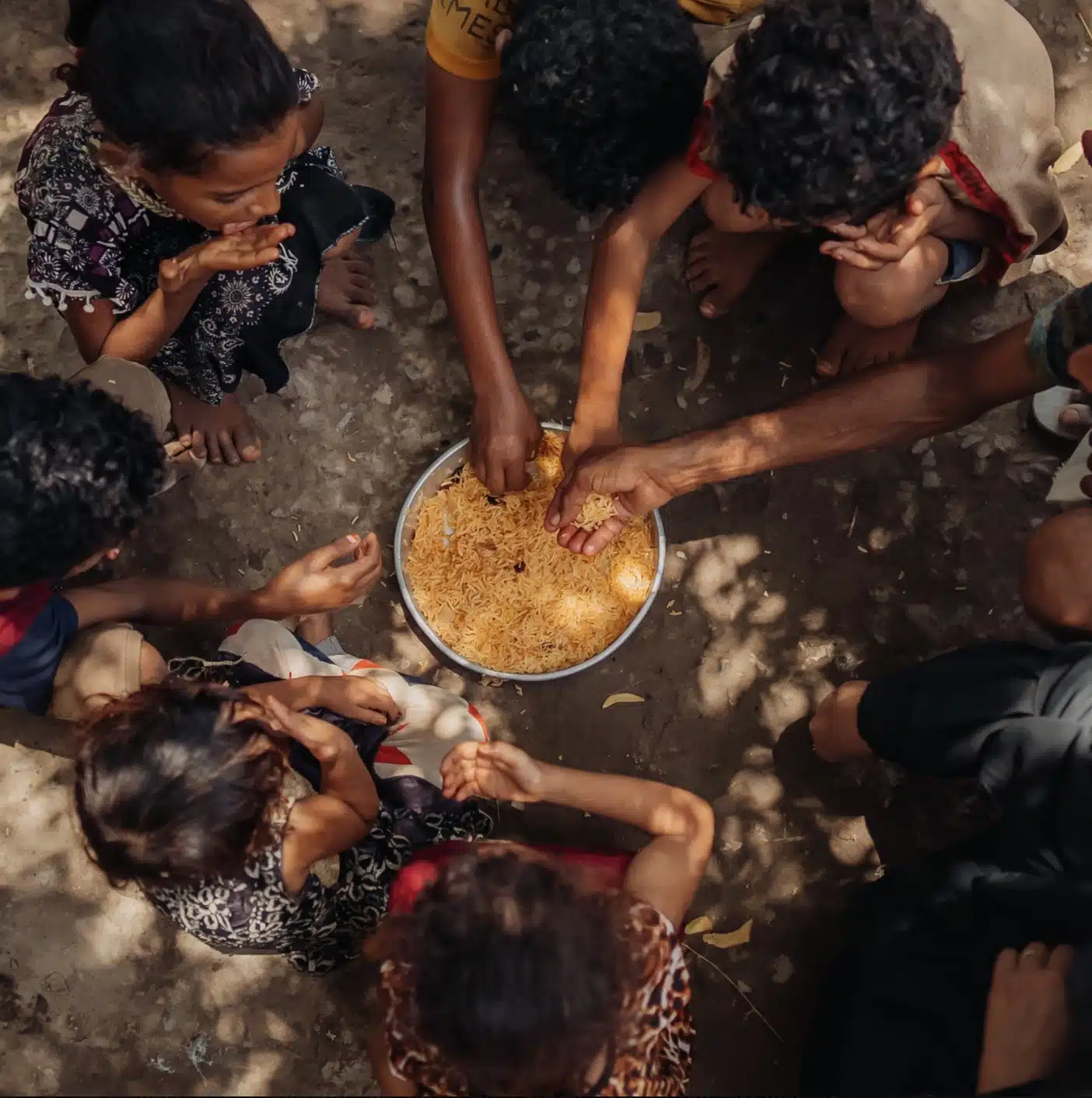
Gazan children in the war breaking the fast of Ramadan on April 6. (WORLD FOOD PROGRAM/X via PassBlue)
“It’s hard to deal with the humanitarian crisis in Gaza when Israel, which is accused of genocide and starving Gazans, is the one providing permission for aid entry after lengthy inspections,” Mona Mina, a physician, activist and former secretary general of Egypt’s Doctors Syndicate, told PassBlue.
Mina, an organizer of the Cairo Gaza petition, said there is also an internal delay in aid trucks reaching the border with the Palestinian enclave because trucks need to show security clearances at checkpoints on the long, complicated road to Rafah.
Aid trucks leaving from Cairo to the Rafah crossing, which is located in Sinai (a 217-mile distance), first take around three hours to reach Ismailia City, in lower Egypt.
After leaving Ismailia, trucks can face major delays because of security clearances en route or being stuck in Arish, the next leg of the journey. Arish is generally overcrowded with other trucks, according to Mina.
“The Egyptian government said that Rafah crossing is open, but the route to Rafah is not open, starting from crossing the Suez Canal, which requires security clearance, and then onto Arish and later all the way to Rafah. Going through all of those steps requires security approvals,” she said.
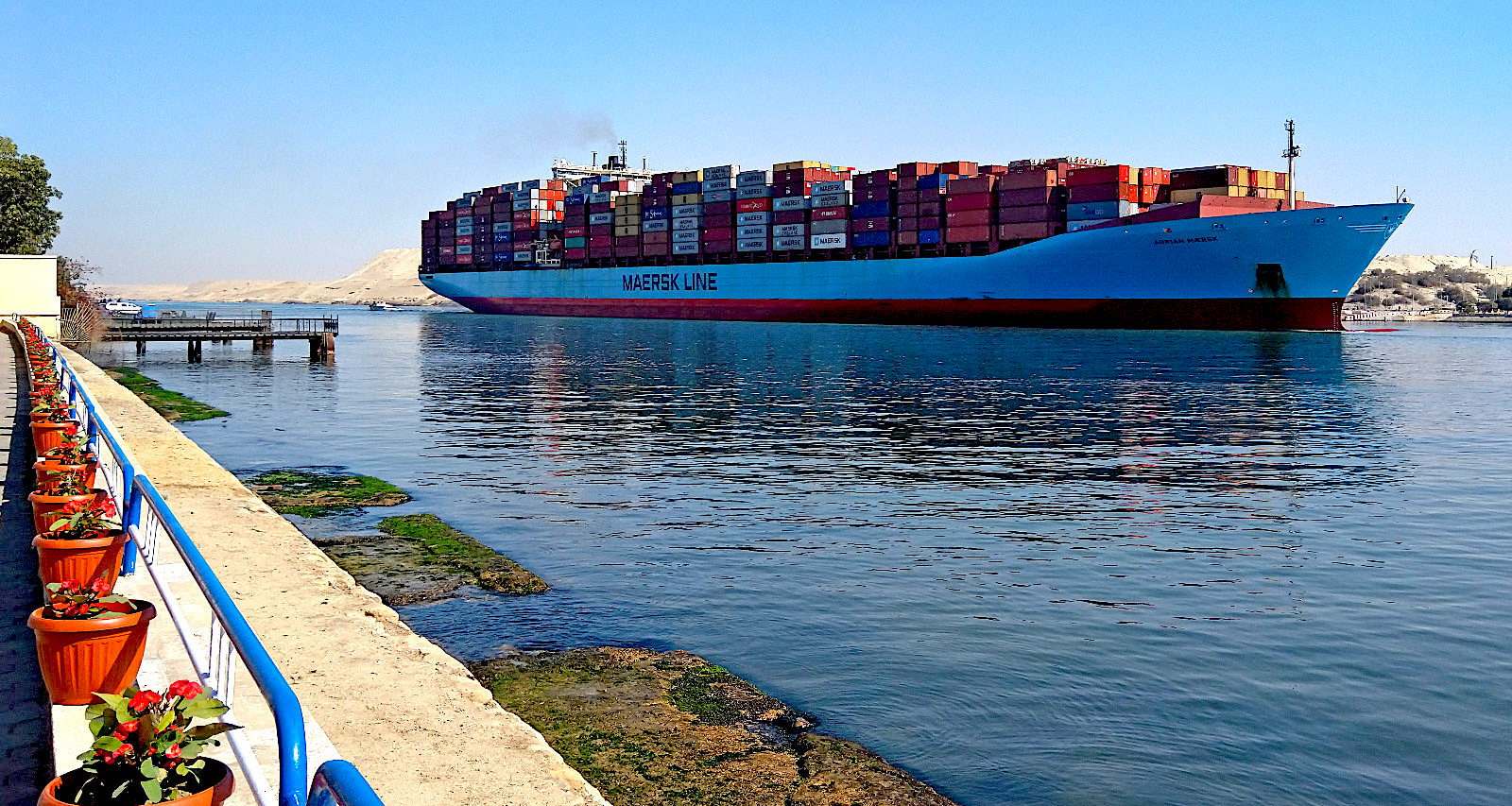
A tanker on the Suez Canal at Ismailia, Egypt, 2019. (Tom Sawyer, Flickr, CC BY-ND 2.0)
The Cairo Gaza advocates’ proposal, however, is not possible without government security clearances to pass through Egypt to the crossing.
The group wanted its proposed convoy to take off on March 8, three days before the start of Ramadan, but Egyptian authorities didn’t provide the clearances. Instead, the Foreign Ministry gave the organizers a March 12 meeting date to discuss the plan, but then the ministry canceled the meeting. A new date hasn’t been scheduled.
Mina said the meeting was canceled because the government official handling Palestine-related matters, whom they were supposed to talk to, was traveling for work. The ministry didn’t assign someone else to meet the group. In response, the group briefly protested in front of the ministry’s building in Cairo.
Some members and other rights activists have been holding brief weekly protests in the last few months on the steps of the Journalists Syndicate, an independent organization advocating for Egyptian media, in Cairo, in solidarity with Palestinians in Gaza.
Last night, hundreds of activists rallied outside the Egyptian Syndicate of Journalists in Cairo, denouncing the ongoing Israeli campaign of genocide in Gaza. pic.twitter.com/kadBeVb9gL
— Chris Hutchinson (@ChrisHu34451470) March 28, 2024
The group breaks its daylong fasting during Ramadan by eating a small piece of bread as they protest to draw attention to the famine underway in Gaza. They also chant their demands to the government to keep the Rafah crossing open.
The latest protest was held on April 3. That night and early the next morning, 10 activists were arrested at their homes on charges of joining a terrorist organization and spreading false news.
The Egyptian Patriotic Movement in a press statement:
-We condemn the campaign of arrests against activists who participated in a solidarity stand for #Gaza in front of the Journalists Syndicate in #Cairo.
-We affirm that campaigns of arrests, intimidation, and threats
1/2 pic.twitter.com/I5V23pNDgV— Bin Ghalib (backup account) (@bgh2_ac3b) April 6, 2024
Alhelou, the Gazan who recently evacuated from the enclave, had been originally forced from his home in northern Gaza with his wife, 8-year-old daughter and 4-year-old son. “Many people were forced out of their homes with nothing but the clothes they had on,” he said.
The IDF, he said, had ordered him and his family to shelter in Khan Younis, in southern Gaza, and promised them that they would find food and safety, but troops led him and his family to a “nearly deserted area that had no infrastructure, or food, or aid, and only a few buildings.”
“[In Khan Younis], people would fight over canned goods and loot aid trucks,” Alhelou said. “It was very hard to find flour, and those who did would be filled with joy as if they stumbled on gold. I saw some people die from hunger and starvation and that was in the south. Imagine how dire things were in the north.”
He and his family stayed in an area with no electricity or bathrooms among many Palestinians who “lived a very dignified life before the war,” he added.
Exorbitant Fees to Flee the War
In January, with Israeli warplanes overhead and no safe place to stay in Gaza, Mudallala Abusalim and her daughter headed to Rafah City to evacuate to Egypt, she said in a phone interview with PassBlue.
“This is one of the most unbelievable wars in history,” she said. “The tanks drove over bodies and the bodies of children were torn apart. I thank God that I wasn’t able to see it but only heard about it.”
Abusalim, who is blind, and her daughter got into Egypt on Jan. 26, going through a process prioritizing certain evacuees over others.
Palestinians can only leave Gaza for Egypt by listing their names with a service called Ya Hala, operated by an Egyptian travel agency, Hala Consulting and Tourism Services. It charges thousands of dollars for arranging individual evacuations, in cooperation with Egyptian authorities.
With Israel imposing a full siege on Gaza after Oct. 7, closing all its land crossings into the Palestinian territory, Gazans had to rely on the single Rafah crossing to leave.
Egypt, however, closed the crossing early into the war, saying it was concerned about Israeli airstrikes making the crossing inoperable. Egypt also feared an influx of refugees and Hamas militants entering and possibly regrouping on Egyptian territory.
“The effectiveness and success of [the Hala system] varies based on your nationality and background,” Dorgham Abusalim, son of Mudallala Abusalim, said on the phone with PassBlue. “This is not a travel fee to cross the border, and the price depends on who you’re talking to, who is your fixer, and who you’re working with.” (Dorgham is Palestinian-American and has been in the U.S. since the war began.)
His mother, speaking by phone, said of the costs:
“I was surprised to know that the lives of Gazans are so cheap and worthless and that death was so much easier, but then when I arrived at the Rafah crossing I learned how expensive it is to cross the borders and asked myself how come our lives were worth nothing in front of the entire world, but now our lives are worth a lot at the Rafah crossing.”
Hala is owned by an Egyptian businessman, Ibrahim al-Argany, who has close ties with Egyptian President Abdel Fattah el-Sisi, according to a report by Mada Masr, an independent Egyptian news outlet. In February, Hala announced that its “coordination fee” is $5,000 for adults and $2,500 for minors.
In the weeks before the war, the prices were as low as $350 a person, according to Mada Masr. On April 3, more than 670 Palestinians crossed into Egypt from Gaza, according to a Telegram post by the Palestinian Rafah crossing authority. The number is around 200 percent higher compared with the number of Gazans crossing daily to Egypt in January.
Despite the enormous hurdles, the Cairo Gaza campaign is undeterred.
“We wish that all this [including aid delivery] would happen through an Egyptian-Palestinian coordination without going back to Israel for permission,” Mahinour el-Massry, the human rights lawyer, said.
—Dulcie Leimbach contributed reporting.
Fatma Khaled has a master’s degree from the Columbia University School of Journalism and a B.A. in print journalism from Misr International University in Cairo. She speaks Arabic and English.
The views expressed in this article may or may not reflect those of Consortium News.

The future looks dismal for both America and Israel. Two nations —but such arrogance. I wonder, where did that “more perfect union ,” disappear to?
I am ashamed to see so many in this nation where We the People are truly lacking in humanity. But then, that happens when WAR becomes any nation’s most important product.
It should not have to take 6 months to let Humanitarian Aid for all those innocent people , if the Egyptian Government had the back bone and conviction to force the criminal Israelis to open those crossings, alas neither Al- SISI nor his cabinet were forthcoming and brave enough to face this challenge which is the duty of any human to do. They have neutralised their relation with the criminal Zionist colony, and are always threatened by America to destabilize this regime and they will loose their authority with all those profits they get on the side if they were ever to support any issue the will oppose Israel or the interests of the US.
Thankyou Ms. Fatma. Your support for your Palestinian brethren will bring about an end to their suffering at the hands of Israeli and western Zionists.